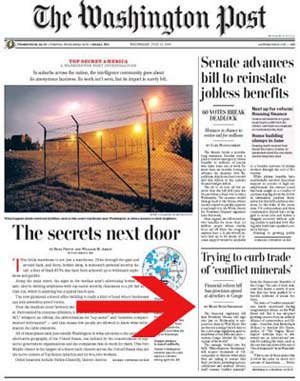Working for an organization that has focused since its inception on drawing attention to conflicts that remain obscure to many Americans – despite being some of the world’s deadliest – it was remarkable to see Congo in so many prominent headlines recently.
One of the leading stories last week was of course President Obama’s signing of the Wall Street reform bill. But several news outlets delved into the 2,300-page bill and highlighted the provision that addresses the role that U.S. companies play in funding atrocities carried out by militias in eastern Congo.
In a front page story in The Washington Post, reporter Mary Beth Sheridan wrote about the impact the new law could have on thousands of U.S. companies:
"This is one of those issues that is below the radar for about 99.9 percent of Americans. . . . Everyone has their cellphone up against their ear, nobody is thinking of Congo or conflict minerals. But everybody's got some, potentially, right next to their ear," said Rep. Jim McDermott (D-Wash.), speaking recently at the Center for American Progress.
Although little noticed by the public, the provision in the regulatory bill could have a broad impact. It applies not only to electronics companies, which are major users of Congolese tantalum, but also to all publicly traded U.S. firms that use tin and gold.
"This is a law that is going to affect virtually the entire U.S. manufacturing sector," said Rick Goss, vice president of environment at the Information Technology Industry Council.
CNN’s The Situation Room also picked up the story and aired this segment by Mary Snow that features an interview with Enough’s John Prendergast and the viral “I’m a Mac” video by actress and activist Brooke Smith for the RAISE Hope for Congo campaign. (By the way, the video spoof now has an astounding 570,000 views.) Here’s the full clip:
One other prominent article was this analysis piece out of Kigali and Kinshasa by Reuters. Quotes from industry and mining interest groups in the region help illustrate the challenge ahead to ensure that the regulations enacted by the Securities Exchange Commission, the agency charged with devising the plan to implement the law, aren’t weakened by interests who benefit from Congo’s unregulated trade in minerals. Many of those groups seem to have quickly adopted the tactic of crying foul on behalf of the miners whose livelihoods depend on the minerals industry in eastern Congo.
On that point: In reality, of course, the well-being of miners in Congo is forefront on the minds of proponents of this new law. Across the board, from Congress, to advocacy organizations, to U.S. government agencies, to the Congolese government, people pushing for regulation of the mining industry in eastern Congo emphasize the importance of creating alternate employment opportunities and of working closely with industry leaders to ensure that the law doesn’t lead to a boycott. The status quo is far from defensible. The new law won’t be a silver bullet that ends the war in eastern Congo, but it is an important step that confronts some key components perpetuating the conflict: funding for armed groups and lack of Congolese government oversight.
The blogosphere too was abuzz with posts about the new conflict minerals law, culminating today with a post by Congo expert Jason Stearns. He summed up the various points of criticism raised in recent posts by writers critical of the law, and addressed them one by one. Stearns pointed out that while many issues need to be addressed to end the conflict in eastern Congo, regulating the supply chain for conflict minerals doesn’t preclude action on the host of other issues. He wrote:
Yes, I wish we could have greater engagement in strengthening the Congolese judiciary and police. I wish there could be meaningful land reform and that disputes over farming rights could be settled by expert mediators (UN Habitat is beginning to do this). I wish we could have transparent democratic institutions throughout the country. But none of those issues stand necessarily in contradiction with due diligence in the minerals trade. I can't tell you how often I have been in meetings with officials at the State Department, insisting that they help in security sector reform and in paying attention to the return of Congolese Tutsi refugees. Nothing much came of that. Now that we have a chance to help promote meaningful reform in the minerals trade, I think we should seize the opportunity.


